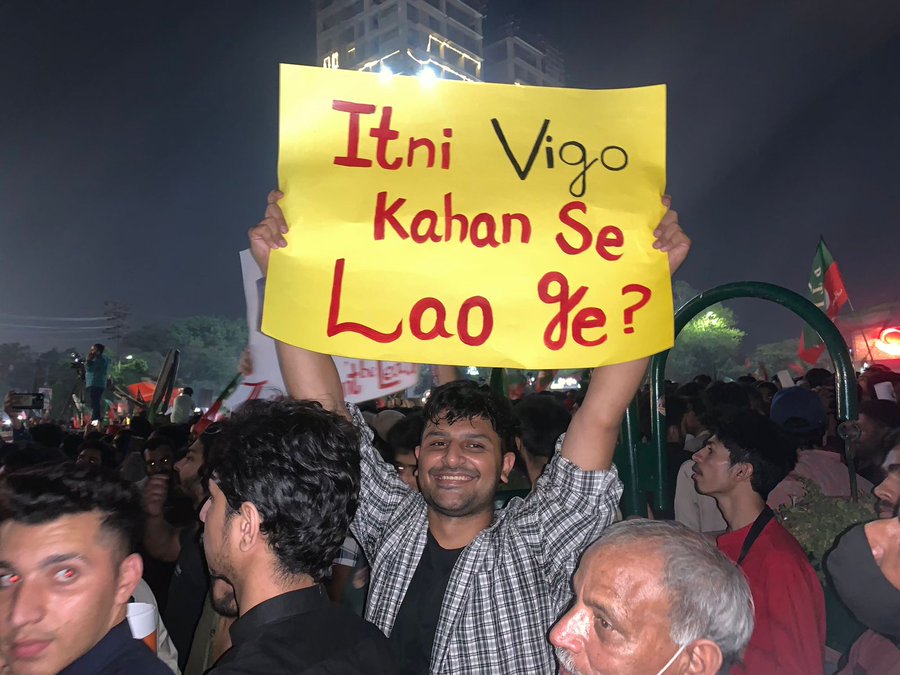DG ISPR Major General Babar Iftikhar’s blistering press conference denying former prime minister Imran Khan’s allegations of a ‘foreign conspiracy’ to oust his government has buried the latter’s dangerous narrative involving treason allegations against his opponents. Using populist slogans against ‘Western slavery’ to fuel its supporters’ sentiments, the PTI has been taking to the streets against the new government.
At the party’s Peshawar jalsa Wednesday evening, the former prime minister doubled down on treason allegations against politicians behind the no-trust motion against him. Anti-army slogans were chanted at the Peshawar rally. Earlier, photos of placards blasting the army chief at the party’s rallies last Sunday had also gone viral on social media. The military’s unequivocal response was therefore inevitable.
PTI’s spin-masters are desperately twisting General Iftikhar’s statement to cover up the sheer embarrassment the military spokesperson has caused them, but the narrative that Imran Khan had planned to peddle as a means to mobilise his support base and give a tough time to the new government has come crashing down.
Not only did the ISPR rubbish Khan’s claims about the National Security Committee having discussed a ‘conspiracy’ against Pakistan, it also confirmed that the former PM’s muscle-flexing against the US was a mere eyewash, as the country had not asked Pakistan for airbases in the first place. The ‘Absolutely Not’ slogan which PTI leaders had been using to express their support to Khan in the wake of the no-confidence motion also stands debunked.
Damned if they do, damned if they don’t
This scathing rebuttal from the military has put the PTI between a rock and a hard place. Rejecting the DG ISPR’s version would entail standing up and openly challenging the military, which is not something the PTI appears ready to do. Much of the party’s support base does not have it in its DNA to stand up to the military establishment. The ‘educated’ (read privileged) urban middle and upper middle-class supporters of PTI from the Punjab look up to the Pakistan Army as the country’s saviour. Many leaders and supporters are already uncomfortable with the anti-army slogans chanted at the party’s recent public events. The PTI cannot risk going all-out against the military, as Khan would not want to burn all boats, especially if he thinks that he remains in the good books of a faction of the military establishment. Given how reliant Khan has been on the establishment from day one, he would certainly prefer to once again win over them instead of adopting an aggressive tone.
But by not openly challenging the DG ISPR, who also stated during his press conference that Pakistan achieved stability in the past few days after the new government (which the PTI declares ‘imported’) was formed, the party would have no narrative to sell during its planned anti-government protests.
PTI is no adherent of civilian supremacy
The PTI’s tirade against the military does not have anything to do with the cause of civilian supremacy. A section of international media, owing to an apparent lack of understanding/research about Pakistan’s political history, has been suggesting that Imran Khan’s ouster exposes the loopholes of the country’s democracy and that he was punished for challenging the establishment.
First, tabling a no-confidence motion was the then opposition’s constitutional right, and the ouster of a PM through constitutional means is not equivalent to dismissals by military coups or disqualifications through court verdicts. Khan’s case is therefore different from that of Nawaz Sharif or Yousaf Raza Gilani (and others before them) who were evidently targeted for challenging the establishment. There is no denying that the establishment’s newfound ‘neutrality’ (which actually meant retraction of the open support the establishment previously lent to Khan) played a significant role in the success of the no-trust motion, but Khan’s ouster cannot be termed undemocratic. It was instead a victory for democracy that a power-hungry ruler who blatantly subverted the Constitution and kept trying to defy the Supreme Court’s orders (until he was threatened with SC’s late-night hearing and according to some reports, dire ‘warnings’) was finally ousted.
Imran Khan’s falling out with the establishment began when the institution tried to save its rapidly-deteriorating reputation by transferring former DG ISI and Khan’s favourite officer General Faiz Hameed who was made the Peshawar Corps Commander. The blue-eyed boy of the establishment got exasperated, because Faiz was his support system when it came to ‘fixing’ the opposition. Since Gen. Faiz was repeatedly accused by the opposition of political engineering, the institution decided to distance itself from the Imran government. The establishment was also finding itself unable to defend the increasing incompetence of the PTI government, which is why it saw no option but to finally withdraw support.
Khan owes the nation an apology
The major difference between Khan and other ousted PMs is that he has learned no lesson from this experience, as he continues to use ‘treason’ allegations against his opponents. “How can you trust these looters with your nuclear programme,” he said while addressing the Peshawar rally. This was an indirect message to the establishment that only he was worthy of their ‘trust’ — meaning thereby that he is still trying to convince the establishment that its decision to stop backing him was wrong.
The reason why Imran Khan ended up on the wrong side of establishment was not some principled stance, but his quest to consolidate his grip on power even at the cost of challenging the military — which had brought him into power in the first place.
A cursory look at the online trends against COAS Bajwa by PTI supporters reveals that while criticising the army chief, the former PM’s supporters praise General Faiz Hameed and former DG ISPR Major General Asif Ghafoor. This means that they are okay with the establishment’s interference in politics as long as it is done to favour their leader, and that they feel wronged because the institution became ‘neutral’ and vowed to let the due process take its course. The PTI’s outburst against the military is therefore not a political awakening, but a desperate form of protest against withdrawal of the support the party until recently enjoyed. The ongoing anti-army campaigns on social media by the PTI therefore have nothing to do with civilian supremacy.
Former human rights minister Shireen Mazari shared a placard from a PTI protest that said “Itni Vigos kahan se laayo ge?” (Where will you get this many Vigos?) — a reference to the enforced disappearance of individuals critical of the establishment, which implies that she was well aware of the pattern under which rights activists were abducted on her watch.
Yet, she did not use her power to put an end to the practice because it was the regime’s critics who were being targeted then. PTI leaders and supporters ran abusive campaigns against critical journalists and rights activists and incited violence against them. The same people who were victimised by the regime have condemned the arbitrary arrests of PTI activists who are now being targeted for their anti-army posts.
If the PTI’s fight had been about ‘civilian supremacy’, their leader should have first apologised to all those who were victimised under his government. The former PM reportedly admitted that filing a reference against Supreme Court judge Justice Qazi Faez Isa was a mistake but stopped short of issuing a public apology. The list of actions for which he would need to apologise is long. It is however unlikely that the PTI would translate its anger into course-correction.
Learning lessons from the past
Meanwhile, the DG ISPR repeated the usual ‘we have nothing to do with politics’ statement when asked about his institution’s position on the latest political development. Judging by Pakistan’s history, such statements do not inspire much confidence. But the downfall of the ‘hybrid regime’, initially considered as a 10-year project, gives some hope for consolidation of democracy in Pakistan. The parties in the coalition government should tread carefully and avoid repeating mistakes of the past. The spirit of charter of democracy must be revived, and the practice of joining hands with the establishment to bring each other down through unconstitutional means must end for good.


